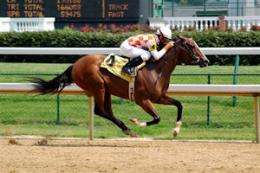Horse racing was best before British, says historian

(PhysOrg.com) -- American horse racing was kinder to the animals, more sporting and more socially egalitarian in the days before the 'ruthless' English version was introduced, according to a historian.
Dr Natalie Zacek, from The University of Manchester says the 1861-1865 Civil War changed American racing forever, by forcing it to modernise using the English model.
The American researcher, who grew up near the world famous Saratoga Race Track in New York, said before the late 1850s, a cross section of all citizens - from Presidents to slaves - took a passionate interest in the sport.
It was so popular that Congress would go out of session when a race was held, George Washington was one the country’s top jockeys and Presidents Jackson and Jefferson were leading breeders of thoroughbreds.
Dr Zacek said: “Before the Civil War, a horse’s stamina was more important than its speed as races, run on dirt, were in three heats of three or four miles.
“The animals weren’t so young as they are today and would walk a couple of hundred miles between races. Nowadays, they just aren’t up to that.
“Because of today’s pressures to be ever faster - which began in the 1860s - inbreeding has gone too far: horses are too young and lightweight, but their strength makes them delicate.
“I remember with horror how the filly Eight Belles was put down after the 2008 Kentucky derby - that all too common scenario would have been unthinkable 160 years ago.”
She added: “Before the civil war, horse racing was less based on class: black and white people went to the races together - even slaves enjoyed the day out and many were jockeys.
“But those days, sadly, have gone. It’s a completely different world nowadays.”
The change, she found, happened because friendly racing rivalry between the northern and southern states descended into dangerous confrontation during the period of the civil war.
The racing fraternity need an alternative and the American ‘Robber Barons’ - new money families such as the Carnegies and the Rockefellers who came to prominence in the 1860s - looked to England for inspiration.
“New money wanted to make itself popular by showing that they had class and learning,” explained Dr Zacek, who is a lecturer at the University’s School of arts, Histories and Cultures.
“Racing became standardised, anglicised, had lots more rules and with little local variation.
“A new body- American Jockey Club named after the English one was born.
“Famous English horses were imported and even the quintessentially American Kentucky Derby was modelled on English racing: its founder Colonel Clark spent a year in Britain studying English racing.”
Provided by University of Manchester (news : web)

















